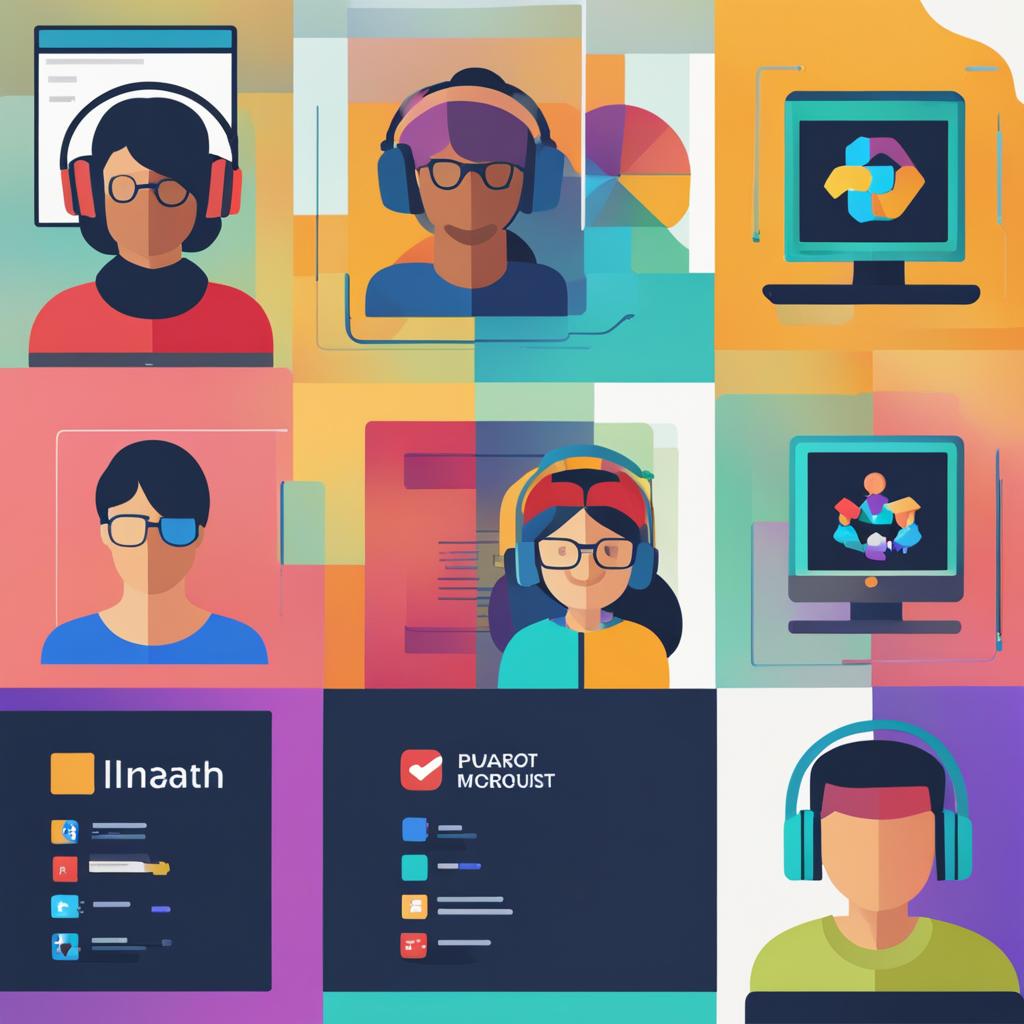Coding is an essential skill for the future, and many people are curious about the best programming languages to learn. In this article, I have collaborated with an expert to identify the top 6 programming languages that can boost your career. We will also discuss how you can learn them for free online.
Whether you’re looking to break into web development, artificial intelligence, or data science, knowing which programming languages are in-demand can give you a significant advantage. By mastering these languages, you can open doors to exciting job opportunities and stay ahead in the rapidly evolving tech industry.
To provide you with the most comprehensive analysis, we have conducted a thorough programming language comparison, taking into account popularity, job opportunities, and industry trends. In this guide, you’ll find the top programming languages for 2024, recommended for their versatility and future prospects.
Are you ready to explore the top 6 programming languages and dive into the world of coding? Let’s get started!
Key Takeaways:
- Learning the top programming languages can significantly boost your career prospects.
- Free online resources make it easy to learn these programming languages at your own pace.
- The top programming languages for 2024 include Java, JavaScript, Python, Swift, C/C++, and SQL.
- Choosing the right programming language depends on your interests, career goals, and industry demand.
- Learning multiple programming languages enhances your problem-solving skills and widens your job opportunities.
Why Should You Learn to Code?
Coding is an invaluable skill in today’s digital world. Whether you are a tech enthusiast or someone looking to enhance your professional prospects, learning to code offers a multitude of benefits.
The Importance of Coding
Coding is not just about writing lines of instructions; it is about unlocking a world of possibilities. Here are some reasons why coding is important:
- Opens Doors to New Career Paths: In a rapidly evolving job market, coding skills are highly sought after. From web development to data science, there are numerous career paths where coding knowledge is crucial.
- Provides Financial Freedom: The demand for skilled programmers continues to grow, resulting in lucrative salaries and job security. By learning to code, you can increase your earning potential and achieve financial independence.
- Enhances Problem-Solving Skills: Coding is all about breaking complex problems into smaller, more manageable tasks. This process helps develop critical thinking, logical reasoning, and problem-solving abilities that can be applied in various aspects of life.
The Future of Coding
As technology continues to advance and automation becomes more prevalent, coding skills will play a vital role in shaping our future. Here are some ways coding will be significant:
- Technological Advancements: Coding enables the development of cutting-edge technologies and drives innovation in fields such as artificial intelligence, machine learning, and robotics.
- Understanding the Digital World: In an increasingly digital society, coding provides the knowledge and skills necessary to comprehend and interact with the technology that surrounds us.
- Adapting to Changing Industries: With automation and digital transformation reshaping industries, individuals with coding skills will have the flexibility to adjust and thrive in ever-changing job markets.
Learning to code opens up a whole world of opportunities and empowers individuals to make a meaningful impact in their personal and professional lives. Take the leap today and embark on a journey of growth and discovery!
How to Learn to Code for Free
Learning to code has never been easier, thanks to the abundance of free resources available online. Whether you’re a beginner or looking to expand your coding skills, there are numerous platforms that offer high-quality tutorials, courses, and interactive lessons. Best of all, these resources are accessible anytime, anywhere, allowing you to learn coding at your own pace.
One of the most popular free coding resources is YouTube, where you can find a wide variety of coding tutorials. Many experienced programmers and tech enthusiasts share their knowledge through video tutorials, making it an excellent platform for visual learners. Simply search for the programming language or topic you want to learn, and you’ll find a wealth of videos to guide you.
In addition to YouTube, several online learning platforms specialize in coding courses. Websites like Codecademy, Coursera, and Udemy offer a vast selection of free coding courses taught by industry professionals. These courses cover a wide range of programming languages, from beginner-friendly options to more advanced topics. The structured curriculum and interactive exercises make it easy to grasp the fundamentals and progressively advance your coding skills.
Another valuable resource is coding platforms such as GitHub and GitLab. These platforms not only provide access to open-source projects but also offer a collaborative coding environment. You can explore existing projects, learn from others’ code, and even contribute to real-world applications. This hands-on experience is invaluable for honing your coding abilities and understanding how coding projects function in real-world scenarios.
Pro Tip: When using free coding resources, it’s important to stay focused and motivated. Set aside dedicated time for learning, find a comfortable learning environment, and break down complex concepts into smaller, manageable tasks.
Best Free Coding Resources:
- YouTube tutorials
- Codecademy
- Coursera
- Udemy
- GitHub
- GitLab
Remember, coding is a practical skill that requires hands-on practice. While these free resources offer an excellent starting point, it’s crucial to apply what you learn by working on coding projects and regularly practicing your skills. By dedicating time and effort, you’ll be well on your way to becoming a proficient coder without breaking the bank.

Java
Java is a versatile and widely used programming language that is favored by major companies around the world. Known for its portability and cross-platform compatibility, Java can run on various systems and devices, including desktops, mobile phones, and embedded systems. Its extensive library and rich ecosystem make it suitable for a wide range of applications, from web development to enterprise software.
If you’re considering a career in programming, learning Java can offer you diverse job opportunities. The language is particularly sought after in fields like Android app development, big data processing, and backend system development. By acquiring Java skills, you can position yourself for success in these lucrative career paths.
To get started learning Java, there are several free resources available. Online platforms such as Codecademy, Coursera, and Udemy offer comprehensive Java courses that cover the fundamental concepts and advanced topics. Additionally, Oracle, the company behind Java, provides extensive documentation and tutorials on their official website.
Below are some recommended free Java courses and resources:
- Java Programming and Software Engineering Fundamentals (Coursera)
- Java Tutorial for Complete Beginners (Udemy)
- Java Tutorials (Oracle)

JavaScript
When it comes to web development, JavaScript is the programming language you can’t afford to ignore. As the most widely used language in the industry, JavaScript is crucial for creating interactive websites, mobile applications, and even video games. With its versatility and wide range of applications, learning JavaScript opens up a world of opportunities in the tech world.
If you’re looking to learn JavaScript without breaking the bank, there are plenty of free resources available online. Here are some highly recommended JavaScript courses and resources:
- Codecademy’s Introduction to JavaScript: This interactive course provides hands-on exercises and quizzes to help you grasp the fundamentals of JavaScript.
- freeCodeCamp’s JavaScript Algorithms and Data Structures Certification: With this certification, you’ll dive deeper into JavaScript concepts and gain practical experience in solving coding challenges.
- MDN Web Docs: JavaScript Guide: As a trusted resource, MDN Web Docs offers a comprehensive guide to JavaScript, covering everything from basic syntax to advanced topics.
Whether you’re a beginner or an experienced programmer, mastering JavaScript is an essential skill that can elevate your career. Start your JavaScript journey today and unlock endless possibilities in web development.

Python
Python is a highly versatile and in-demand programming language that offers a wide range of career opportunities. It has gained popularity in various fields such as web development, data science, and desktop applications. Learning Python can open doors to numerous job opportunities in the tech industry.
Python’s simplicity and readability make it an excellent choice for beginners and experienced programmers alike. Its clean syntax and extensive libraries allow developers to build applications quickly and efficiently. Python is known for its emphasis on code readability, making it easier to understand and maintain.
Whether you’re interested in building websites, analyzing data, or developing software, Python has you covered. It has a strong presence in the web development community, with popular frameworks like Django and Flask powering many websites and web applications.
In the field of data science, Python’s libraries such as NumPy, Pandas, and SciPy provide powerful tools for data manipulation, analysis, and visualization. Python is also extensively used in machine learning and artificial intelligence, with libraries like TensorFlow and PyTorch enabling developers to create advanced models and algorithms.
For those interested in desktop applications, Python offers frameworks like Tkinter and PyQt that enable the creation of user-friendly and cross-platform applications.
Learning Python is an investment in your future. It equips you with the skills needed to succeed in today’s tech-driven world. Whether you’re just starting your programming journey or looking to expand your skill set, there are plenty of free Python courses and resources available online.
By dedicating time to learn Python, you’ll gain a valuable skill set that can lead to exciting career opportunities and personal growth.
Free Python Courses and Resources
Here are some recommended free Python courses and resources to help you get started:
- Codecademy’s Learn Python – A comprehensive interactive course that teaches Python from scratch.
- LearnPython.org – An interactive Python tutorial where you can learn by coding in the browser.
- edX’s Introduction to Python – A beginner-friendly course that covers the fundamentals of Python programming.
- Python Documentation – The official documentation for Python, which provides in-depth explanations and examples.
- Python Community – Joining the Python community can be immensely helpful in learning and growing as a developer. The Python community offers forums, mailing lists, and online communities where you can ask questions and collaborate with other Python enthusiasts.
Start your Python learning journey today and discover the endless possibilities it brings!

Swift
Swift is an essential programming language for developing iOS and macOS applications. If you have a passion for mobile app development on Apple devices, learning Swift is a must. With its powerful and intuitive syntax, Swift enables you to create robust and high-performance apps that deliver exceptional user experiences.
When you learn Swift, you gain access to a rich set of libraries and frameworks that streamline the development process. This means you can build advanced features and functionalities in a shorter amount of time. Additionally, Swift offers seamless compatibility with Objective-C, allowing you to easily integrate existing codebases into your projects.
Whether you are an experienced developer or just starting your coding journey, there are numerous resources available to help you learn Swift for free. Online tutorials, interactive courses, and documentation provide comprehensive learning materials to suit various learning styles.
“Swift is a modern programming language that combines performance and safety. It’s incredibly expressive and easy to read, making it a joy to work with.”
Benefits of Learning Swift:
- Swift is the future of iOS development, with Apple heavily investing in its ongoing development and improvement.
- It has a growing community of developers who actively share their knowledge and support one another.
- Learning Swift opens up exciting career opportunities in the vibrant and lucrative field of iOS app development.
- Swift’s safety features, such as type checking and optionals, reduce common programming errors and enhance code reliability.
- As Swift continues to evolve, you’ll have the opportunity to contribute to its growth and shape the future of app development.
Ready to get started with Swift? Here are some free resources to help you begin your Swift learning journey:
- Official Swift Documentation: Apple’s official documentation provides a comprehensive guide to Swift syntax, features, and best practices.
- Hacking with Swift: A free online resource that offers practical examples and projects to learn Swift.
- Udemy Swift Courses: Udemy offers a variety of free and paid courses taught by experienced Swift developers.
Start your Swift learning journey today and unlock the door to a world of possibilities in iOS and macOS app development.
C and C++
When it comes to programming languages that excel in efficiency and versatility, C and C++ are at the forefront. These languages have been widely adopted and are commonly used in various fields, including system programming, game development, and application software.
Learning C and C++ can provide you with a solid foundation in programming principles, as they are known for their low-level control and performance. Once you master these languages, understanding other programming languages becomes easier.
To help you get started on your journey to learning C and C++, here are some free resources that you can utilize:
- Learn-C.org – This online platform offers interactive tutorials and exercises to help beginners learn C programming. It covers all the essential concepts and provides hands-on coding practice.
- Learn-Cpp.org – If you’re interested in learning C++, this website provides comprehensive tutorials and quizzes to guide you through the language. It covers topics ranging from basic syntax to more advanced concepts.
- C for Everyone – This free online course on Coursera, taught by the University of California, provides a beginner-friendly introduction to C programming. It covers fundamental concepts and practical applications.
- C++ For C Programmers, Part A – If you already have a background in C programming and want to transition to C++, this course on Coursera is a great choice. It focuses on the differences and enhancements in C++ compared to C.
Whether you’re interested in system-level programming, game development, or simply expanding your programming skills, learning C and C++ is a valuable investment. Take advantage of these free resources to start your journey and unlock a world of possibilities.
SQL for Data Management: Harness the Power of Data Manipulation
When it comes to managing and manipulating data in databases, SQL programming language is an essential tool in the modern tech landscape. Whether you’re working on web applications or database management, learning SQL can unlock a world of possibilities and lucrative career opportunities.
SQL, which stands for Structured Query Language, provides a standardized way to interact with databases. It allows you to perform various operations, such as querying, inserting, updating, and deleting data, all with a few simple commands. With SQL, you can efficiently retrieve valuable insights from complex datasets, ensuring effective data management and analysis.
By mastering SQL, you gain the ability to work with relational databases, such as MySQL, PostgreSQL, and Oracle. These databases are widely used in industries like e-commerce, finance, healthcare, and many others. The demand for professionals skilled in SQL is continuously growing.
So, where can you start learning SQL for free? Here are some top recommendations:
- SQLZoo: This interactive platform offers hands-on SQL exercises for beginners and advanced learners. With its user-friendly interface, you can practice SQL queries and gain real-world experience.
- Codecademy: Codecademy provides a comprehensive SQL course that covers fundamental concepts, data manipulation, and advanced techniques. Their interactive lessons and quizzes ensure a practical learning experience.
- W3Schools: W3Schools offers an extensive SQL tutorial, covering everything from basic syntax to advanced join queries. Their clear explanations and examples make it easy to grasp SQL concepts.
By taking advantage of these free resources, you’ll be well on your way to mastering SQL programming and becoming proficient in data management. With SQL skills in your arsenal, you’ll have a competitive edge in the job market and open doors to exciting career prospects.
“SQL is the language that allows us to access, manipulate, and analyze vast amounts of data. It’s like a superpower for anyone working with databases.”
| Advantages of Learning SQL | Career Opportunities |
|---|---|
| 1. Efficient data manipulation | 1. Database administrator |
| 2. Enhanced data analysis | 2. Data analyst |
| 3. Streamlined database management | 3. Business intelligence developer |
| 4. Improved decision-making | 4. Data engineer |
| 5. Industry-agnostic skill | 5. SQL developer |
By mastering SQL, you’ll have the power to effectively manipulate and manage data, unleashing its insights and driving informed decision-making. Remember, the SQL programming language is a valuable asset that can propel your career in the data-driven era.
Other Notable Programming Languages
In addition to the top 6 programming languages discussed earlier, there are several other notable languages worth mentioning: TypeScript, Rust, Go, C#, and Elixir. These languages have gained popularity in recent years and offer unique features and applications that make them valuable additions to any developer’s toolkit. Let’s take a closer look at each of these languages:
TypeScript
TypeScript is a statically-typed superset of JavaScript that adds optional type annotations. It offers better scalability and maintainability for large-scale applications. TypeScript is widely used in web development and is particularly popular with Angular developers. By incorporating static types, TypeScript helps catch potential errors during development and improves code quality.
Rust
Rust is a systems programming language known for its focus on safety, performance, and concurrency. It provides memory safety guarantees without sacrificing efficiency, making it suitable for low-level programming. Rust’s syntax is reminiscent of C and C++, but it includes modern features like pattern matching and memory management. It is gaining popularity for its ability to write reliable and efficient code.
Go
Go, also known as Golang, is a language created by Google that emphasizes simplicity, readability, and efficiency. It has built-in support for concurrency, making it suitable for highly concurrent applications. Go is commonly used for backend development, web servers, and cloud-based services. Its simplicity and robustness have made it a favorite among developers who value productivity.
C#
C# is a versatile and object-oriented language developed by Microsoft. It is widely used for building Windows applications, web applications, and game development using the Unity engine. With its extensive framework and ecosystem, C# offers developers a wide range of possibilities. It is a popular choice for developers who prefer working in a Microsoft environment.
Elixir
Elixir is a functional programming language built on top of the Erlang Virtual Machine (BEAM). It is known for its scalability, fault tolerance, and reliability. Elixir is particularly well-suited for building distributed systems and concurrent applications. It has gained popularity in the web development community, especially for building real-time and high-performance applications.
For resources to learn these languages, refer to the table below:
| Language | Resources |
|---|---|
| TypeScript | FreeCodeCamp, TypeScript Handbook |
| Rust | The Rust Programming Language book, Rust by Example |
| Go | Tour of Go, Go by Example |
| C# | Microsoft Learn, C# Yellow Book |
| Elixir | Elixir School, Programming Elixir |
Explore these languages to expand your programming horizons and discover new possibilities in the software development industry.
How to Choose the Right Programming Language for You
When it comes to choosing a programming language to learn, there are several factors to consider. Your specific goals, interests, and career aspirations should guide your decision. To help you make an informed choice, I’ve compiled a list of important factors to consider:
- Job Market Demand: Research the job market to identify the programming languages that are in high demand. This will increase your chances of finding job opportunities in your desired field.
- Project Requirements: Consider the type of projects you want to work on. Different programming languages excel in different areas, such as web development, mobile app development, data analysis, or artificial intelligence.
- Learning Curve: Evaluate the difficulty level of each programming language. Some languages may have a steeper learning curve, while others are more beginner-friendly. Assess your comfort level and willingness to invest time and effort into learning.
- Community Support: Look for programming languages with robust and active communities. These communities provide helpful resources, tutorials, and forums where you can seek assistance when facing challenges.
- Scalability: Consider the scalability of the language. Will it be able to handle projects of increasing complexity and size? Ensure that the language you choose is scalable and adaptable to future needs.
- Integration: Check if the chosen programming language integrates well with other technologies and frameworks that you may need to use in your projects. Compatibility and ease of integration are crucial for efficient development.
By carefully evaluating these factors, you can make an informed decision that aligns with your goals and aspirations. Remember, there is no one-size-fits-all programming language. It’s essential to choose a language that resonates with you and fits your unique requirements.
Now, let’s dive deeper into each factor and explore how they can impact your programming language selection:
Job Market Demand
Understanding the job market demand for different programming languages is crucial for maximizing your career opportunities. Research the skills in demand within your desired industry and consider learning languages that match those skill sets. For example, web development often requires proficiency in HTML, CSS, and JavaScript, while data science may require knowledge of Python and R.
Project Requirements
Different programming languages excel in different areas. Consider the specific project requirements and choose a language that is best suited for the task at hand. For instance, if you want to develop mobile applications for iOS, learning Swift is essential, while Java is commonly used for Android development.
Learning Curve
Take into account the complexity and learning curve of each programming language. Some languages, such as Python and JavaScript, are more beginner-friendly and have extensive resources available for novice learners. On the other hand, languages like C++ and Rust might have a steeper learning curve, requiring additional time and effort to master.
Community Support
A strong and active community can greatly facilitate your learning journey. Choose programming languages with vibrant communities that provide ample support, resources, and opportunities for collaboration. These communities can be valuable sources of knowledge, mentorship, and networking.
Scalability
Consider the scalability of the programming language for future projects. Will the language be able to handle larger projects with increasing complexity? Scalability is important to ensure that your chosen language can evolve along with your skills and project requirements.
Integration
Assess the compatibility and integration capabilities of the programming language. Will it seamlessly work with the frameworks, tools, and technologies you plan to use? Choosing a language that integrates well with the rest of your tech stack will make development smoother and more efficient.
By taking these factors into consideration, you can choose a programming language that suits your unique needs and sets you up for success in your coding journey.
Benefits of Learning Multiple Programming Languages
Learning multiple programming languages can offer a multitude of advantages for aspiring developers and seasoned professionals alike. The ability to work with diverse programming languages not only enhances problem-solving skills but also makes you more adaptable in an ever-evolving tech landscape. Moreover, programming language diversity opens up a world of new career opportunities.
By learning multiple programming languages, you gain a broader perspective on coding concepts, syntax, and best practices. This broader understanding allows you to approach problems from different angles and find creative solutions. Each programming language has its unique strengths and weaknesses, and by mastering multiple languages, you can leverage the strengths of each to design efficient and robust applications.
Furthermore, programming language diversity enhances your versatility as a programmer. You become proficient in handling various projects and can switch between languages based on project requirements. This adaptability makes you a valuable asset to employers, as you can contribute to a wider range of projects and collaborate seamlessly with teams working in different technical environments.
With the increasing demand for multi-skilled developers, learning multiple programming languages can significantly expand your career opportunities. Many companies and organizations seek developers who can work across different stacks and languages, offering attractive job prospects and higher earning potential.
Additionally, programming language diversity enables you to explore various domains and industries. You can specialize in web development, mobile app development, data science, machine learning, or game development, among others. The versatility provided by multiple programming languages allows you to pursue your interests and adapt your skills to different industries or projects as needed.
Embracing diverse programming languages also fosters continuous learning. As new languages and frameworks emerge, you can quickly adapt and learn them more effectively due to the foundation of knowledge you have built through learning multiple languages. This adaptability ensures that you stay relevant and up to date in the rapidly evolving tech industry.
As you embark on your programming journey, consider the advantages of learning multiple programming languages. It not only enhances your problem-solving abilities and adaptability but also expands your career prospects. So, embrace programming language diversity and unlock a world of endless opportunities and growth.
Conclusion
After delving into the world of programming languages, we have explored the top 6 programming languages and provided recommendations for free resources to learn them. These languages, including Java, JavaScript, Python, Swift, C/C++, and SQL, offer diverse career opportunities and are highly valuable in today’s tech industry.
Learning a programming language requires dedication and practice, but the rewards are well worth it. By acquiring coding skills, you can open doors to new career paths, enhance problem-solving abilities, and stay ahead in the rapidly evolving digital landscape.
Now that you have gained insights into the world of programming languages, it’s time to embark on an exciting journey. Choose a language that aligns with your interests and career goals, leverage the recommended free resources, and start your learning adventure today. Remember, continuous learning and practice will help you unlock the full potential of your coding abilities.
FAQ
What are the top programming languages to learn?
The top programming languages to learn are Java, JavaScript, Python, Swift, C and C++, and SQL.
Why should I learn to code?
Learning to code is important as it opens doors to new career paths, provides financial freedom, and enhances problem-solving skills.
How can I learn to code for free?
You can learn to code for free through YouTube tutorials, online courses, and coding platforms that offer a wealth of information and interactive lessons.
What is Java used for?
Java is used for various applications such as Android development, big data, and backend development.
What is JavaScript used for?
JavaScript is widely used for web development, creating interactive websites, mobile applications, and video games.
What is Python used for?
Python is used in web development, data science, and desktop applications, offering numerous job opportunities in the tech industry.
Why should I learn Swift?
Learning Swift is essential if you are interested in mobile app development for iOS and macOS.
What are C and C++ used for?
C and C++ are widely used in system programming, game development, and application software, providing a strong foundation in programming.
Why is learning SQL important?
Learning SQL is essential for managing and manipulating data in databases, making it valuable for web applications and database management.
Which other programming languages are notable?
Other notable programming languages include TypeScript, Rust, Go, C#, and Elixir, each offering unique features and applications.
How do I choose the right programming language?
To choose the right programming language, consider your specific goals, interests, and career aspirations.
What are the benefits of learning multiple programming languages?
Learning multiple programming languages enhances problem-solving skills, adaptability, and widens career opportunities.
Our Friends
- https://millennialmoney.com/top-6-programming-languages/
- https://www.fullstackacademy.com/blog/nine-best-programming-languages-to-learn
- https://www.simplilearn.com/best-programming-languages-start-learning-today-article
Money posts:
 Top 5 Ways to Get Paid to Code in 2024
Top 5 Ways to Get Paid to Code in 2024
 Is Personal Capital Safe to Use? (2024)
Is Personal Capital Safe to Use? (2024)
 The 19 Best Freelance Websites in (2024)
The 19 Best Freelance Websites in (2024)
 Is Blitz Win Cash Legit? Review (2024)
Is Blitz Win Cash Legit? Review (2024)
 Top 22 Ways to Make $10 a Day (2024)
Top 22 Ways to Make $10 a Day (2024)
 11 Best Online Typing Jobs For Beginners (Make $20+/Hour) 2024
11 Best Online Typing Jobs For Beginners (Make $20+/Hour) 2024
 Where to Find Top Product Tester Jobs (From Home!) (2024)
Where to Find Top Product Tester Jobs (From Home!) (2024)
 Where to Find Top Product Tester Jobs (From Home!) (2024)
Where to Find Top Product Tester Jobs (From Home!) (2024)

